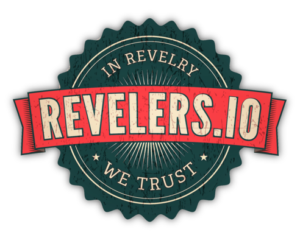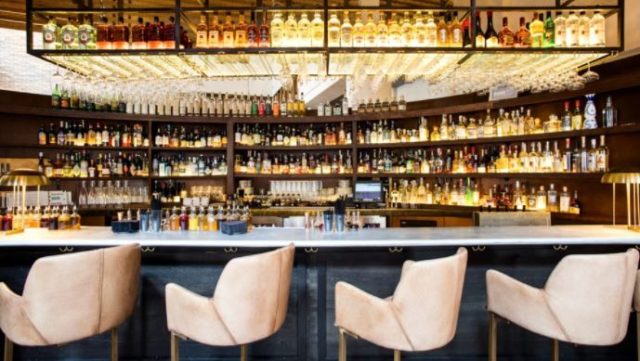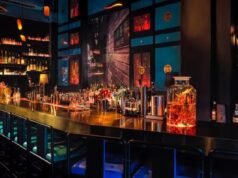Training a bar staff to be well-versed in the 100 spirits found at a standard cocktail bar can be difficult enough, but what about a bar that has more than 1,200 spirits and upwards of 130 cocktails? That’s what beverage director Kyle Tran faced as he opened the Library of Distilled Spirits outside of New York’s Union Square in May, a place where guests are greeted with The Principal Bartender’s Private Study, a collection of about 30 cocktails created by Tran and fellow bar team member Frederico Avila.

The same basic training principles apply, he says, but the Library of Distilled Spirits training sessions certainly kicked it up a notch, with three weeks of “an intensive crash course” that focused on the science, history, and culture of distilled spirits, including logistical training as well as roundtable discussions.
With his extensive expertise and background, previously working under industry vets Jason Huffman, Micah Melton and Julia Momose, we tapped Tran to offer his staff training know-how to help any bar program, whether the goal is to be spirit-focused or just the best draft beer bar in the game.
Restaurant Insider: How important is proper staff training?
Kyle Tran: I think that businesses fail to properly train their staff because of the high turnover rate in this industry. They think, “Why invest in a staff that is going to leave you in six months to a year?” I ask, “What if you don’t invest in your staff, and they stay?!”
What’s one common training mistake you’ve seen?
Assuming that new people already know what you want them to know. Some people get offended when you take them back to fundamentals, but how often do we forget basic steps of service? Doing the little things right create a foundation for high-level execution. High-level performers always remember to focus on the fundamentals. To do well in this industry is to pay attention to the details.
What does your typical training program look like for your bartenders?
Training is never-ending for us here. We would not be able to succeed here if the sharing of knowledge was not central to the culture. … Every day, the apprentices work alongside a principal bartender who focuses on every execution detail. There is a lot of micro-managing the first few months with apprentices, but we believe in perfecting the fundamentals. We train them like boxers with a trainer overseeing their development. Good bartenders are models of efficiency. The only way to get fast is to become a master of repetition.
How does training for the Library of Distilled Spirits differ from other bars?
It’s much more intense. I think that is why our program is so appealing to these apprentices. They are all great bartenders already. I love that they have the humility to say that they want to continue to grow. … Most beverage programs have very short training programs. They focus on their menus and their verbiage and their own personal issues. We are training professional career bartenders.
With more than 1,200 spirits and 130-plus cocktails, how much do you expect bartenders to commit to memory?
I don’t have an amazing memory. I don’t expect my team to. They all need to have a strong fundamental understanding of the category as a baseline. From there, it takes time to create a mental database of all the spirits. … You should certainly know the mash bill and oak treatment, but how does that relate to the guest? Can you figure out what their flavor preferences are? Which spirits on the list would fit those preferences? The ability to sell is important but more than that, I need people who understand it is about guiding guests through an experience.
Any tips for remembering that key information?
It’s all anecdotal. I have a few apprentices who learn well from me just rattling off the technical specs, but it’s more enjoyable to remember a story or an experience. We have fun when we taste. We try to avoid using generic tasting notes. I always loved WineLibraryTV back in the day on YouTube. My man Gary [Vaynerchuk] used to describe wines with descriptors like red Jolly Rancher and Lucky Charms marshmallow. That is way more fun than “soft caramel with honeyed vanilla and a lingering apple peel finish.” That’s boring. I don’t want to hear it, the guests don’t want to hear it.
From a management perspective, how do you bring out the best performance from your staff?
I highly encourage my staff to be themselves. Our team has been hand-picked because of their personalities and energy. One thing that most bars do not do is help their staff deal with the mental and emotional stress that comes with dealing with people. Everyone has bad days, including servers and bartenders. How we manage our emotions can be completely in our control. If we can help bartenders to have more good days than bad, our guests will feel that. … I believe we are in the business of emotions and experiences. How we make people feel is what they’ll remember.
You’re just as likely to find Meghan ordering a rye Old Fashioned at a new bar as you are to find her sipping chamomile tea while she gets too much take-out delivered. She believes in trying new foods, indulging in tasting menus, and always ordering dessert.





